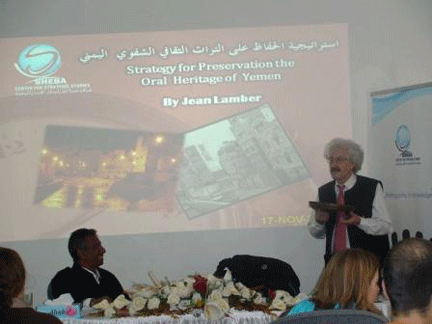
Dr. Jean Lambert: Adopting a National Strategy for Preserving Yemen’s Oral Heritage is Necessary
Sheba Center for Strategic Studies, November 2008
In his lecture delivered on Nov. 11, 2008, at the SCSS, French researcher and anthropologist Jean Lambert prompted the adoption of a national strategy for preserving Yemeni oral heritage and recording it in a well-studied methodology. He pointed out that Yemen’s cultural heritage contains a long and rich list of the narrated heritage which is falling into oblivion and facing extinction as a result of carelessness. He also pointed out that the areas rich with this culture are overlapped and interconnected, making it clear that singing is related to tales, stories and different walks of daily life such as poetry, dancing, and afternoon and evening entertaining sessions, and that all of these areas are fertile grounds for determining the features of any culture.
Dr. Lambert expressed his fears that the increasing race for the modern art and contemporary artful products to make commercial gains might make people abandon that rich legacy. In regard to the strategy for which he called, the lecturer said it would be a project aimed at forming a “cultural memory” with modern video-visual means and would start with surveying and verifying all the aspects of the oral heritage comprising lyrical poetry, proverbs, tales, mother-child poetry, and anything that falls under the cultural legacy framing that memory, and then establishing a database for categorizing each type of art. In respect to this context, the lecturer talked about how he had been able to incorporate Sanani singing into the UNESCO’s World Heritage List in 2003 and to document and record 350 Sanani melodies, indicating the international care for this project as a human heritage benefiting all societies.
The anthropologist and specialist in Yemeni heritage requested the concerned authorities to adopt a wide-scale national strategy for compiling and recording Yemen’s abundant and rich culture, as he described it. Referring to his individual limitations and inability to carry out the task required for preserving the oral heritage, the lecturer has pointed out that it is more a technique than a strategy which calls for the contribution from all parties who are aware of the significance of recording all aspects of the oral heritage that contain priceless moral and educational values contributing to the individual’s social and psycho-educational raising and that could guard Yemeni children against any foreign product, particularly animated cartoons and could form educational culture emanating from the cultural legacy which is significant for raising and educational constitution.
The success of the strategy, according to the lecturer, is contingent on the interaction of the government sector in addition to the civil society, and the latter has started compiling and recording a lot of cultural data.
It is worth noting that researcher Jean Lambert has devoted his attention throughout the last years to the Sanani singing and carried out an unprecedented documentation. He presently intends to complete this project and to work on more wide-scale projects including poetry, proverbs, children’s traditional games, lyrics and songs repeatedly sung by children from cradle to a very advanced phase of their teens.